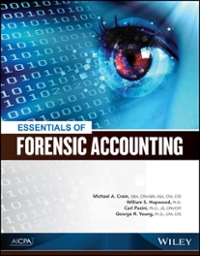Question
The 12 partners of a regional public accounting firm met in special session to discuss audit engagement efficiency. Jones spoke up, saying, We all certainly
The 12 partners of a regional public accounting firm met in special session to discuss audit engagement efficiency. Jones spoke up, saying, "We all certainly appreciate the firmwide policies set up by Martin and Smith, especially in connection with the audits of the large clients that have come our way recently. Their experience with a large public accounting firm has helped build our practice. But I think the standard policy of conducting tests of internal control on all audits is raising our costs too much. We can't charge our smaller clients fees for all of the time the staff spends on this work. I would like to propose that we give engagement partners discretion to decide whether to doa lot of work on assessing control risk. I may be old-fashioned, but I think I can finisha competent audit without it." Discussion on the subject continued but ended when Martin said, with some emotion, "But we can't disregard generally accepted auditing standards like Jones proposes!"
Required:
What do you think of Jones's proposal and Martin's view of the issue? Discuss.
instructor's answer (pls dontcopy, use as reference)
Importantly, Jones has not proposed that the firm refrain from complying with GAAS. Under GAAS, the auditor must review and gain an understanding of the system of internal control and must document that understanding in the workpapers. However, under GAAS, the test of controls need be completed on those controls only on which the audit team believes to be strong and intends to rely on to reduce substantive procedures for a particular financial statement assertion.
However, it is critical to point out that the auditor is required to gain enough of an understanding of internal control to know what could go wrong in the financial statements. This is a common problem in small CPA firms that audit small businesses. In such situations, the auditor can often complete the audit in an effective and efficient manner by merely completing extensive substantive testing with very little work done on the internal control system. For an auditor of a privately held company (not subject to Section 404 of Sarbanes-Oxley), this is a decision that is based purely on the economics (i.e., cost-benefit) of a particular audit engagement.
Step by Step Solution
There are 3 Steps involved in it
Step: 1

Get Instant Access to Expert-Tailored Solutions
See step-by-step solutions with expert insights and AI powered tools for academic success
Step: 2

Step: 3

Ace Your Homework with AI
Get the answers you need in no time with our AI-driven, step-by-step assistance
Get Started


